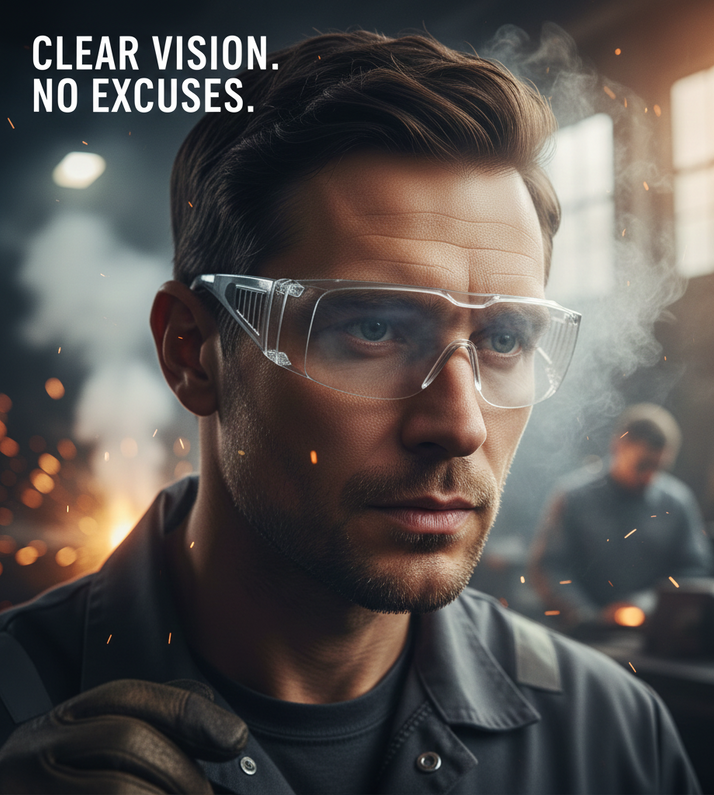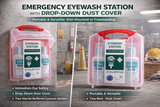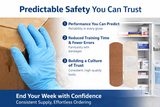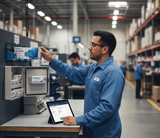Clear Vision, No Excuses: Why Anti-Fog Safety Glasses Are Non-Negotiable
In demanding work environments, crystal-clear vision isn't a luxury—it's a critical safety requirement. Yet, countless workers every day battle the frustration and danger of fogged-up safety glasses. Whether it's moving from a cold outdoor environment to a warm indoor space, working in high humidity, or engaging in strenuous physical activity, fogged lenses are a major culprit behind accidents and decreased productivity.
This isn't just an annoyance; it's a hazard. Compromised vision can lead to slips, trips, falls, contact with machinery, and other serious injuries. That's why investing in high-quality anti-fog safety glasses is not just smart—it's non-negotiable for any safety-conscious operation.
The Science Behind the Fog (and How Anti-Fog Fights Back)
Fog forms when warm, moist air meets a cooler surface, causing the water vapor in the air to condense into tiny droplets. On a safety lens, these droplets scatter light, making the lens opaque.
Traditional lenses are prone to this. However, anti-fog safety glasses utilize advanced coatings that work in one of two ways:
-
Hydrophilic Coatings: These coatings absorb moisture, preventing droplets from forming. Instead, they spread the water evenly across the lens as a thin, invisible film.
-
Hydrophobic Coatings: These coatings repel water, causing moisture to bead up into larger droplets that roll off the lens, maintaining clarity. (Your Site Boss FogLess® 3Sixty™ coating is an excellent example of this enhanced hydrophobic technology).
Both methods achieve the same goal: maintaining clear vision when you need it most.
Why Anti-Fog is Essential in Your Workplace
Consider these common scenarios where anti-fog technology is a lifesaver:
-
Temperature Transitions: Moving between indoor and outdoor environments, or from a cool storage area to a heated production floor.
-
High Humidity: Working in kitchens, laundries, power plants, or any area with significant steam or moisture in the air.
-
Physical Exertion: Heavy lifting, strenuous manual labor, or any activity that raises body temperature and increases perspiration.
-
Respirator Use: Respirators direct exhaled breath upwards, often leading to immediate fogging of eyewear.
-
Specific Industries: Construction, manufacturing, food processing, healthcare, and any job involving varied environmental conditions.
The Hidden Costs of Fogged Lenses
Beyond the obvious risk of injury, fogged lenses carry several hidden costs:
-
Decreased Productivity: Workers constantly stop to wipe lenses, clean glasses, or even remove them entirely.
-
Non-Compliance: Frustrated workers might remove their safety glasses, leaving them vulnerable to hazards.
-
Eyewear Damage: Frequent wiping with dirty gloves or clothes can scratch lenses, reducing their lifespan and optical quality.
Choosing the Right Anti-Fog Protection
When selecting anti-fog safety glasses for your team, look for:
-
Long-Lasting Coatings: Ensure the anti-fog properties are permanently bonded to the lens, not just a temporary dip.
-
Dual-Sided Coatings: Protection on both sides of the lens is crucial for comprehensive fog prevention.
-
Compliance: Always verify ANSI Z87.1+ high-impact compliance, even with advanced coatings.
-
Comfort: Ergonomic fit, flexible temples, and adjustable nose pads will encourage consistent wear.
Don't let fog cloud your team's vision or compromise their safety. Investing in reliable anti-fog safety glasses is a proactive step towards a safer, more productive work environment. Ensure your PPE program includes eyewear that can stand up to real-world challenges, keeping vision clear and workers protected.
Ready to see clearly? Explore our advanced anti-fog safety glasses today!
Recent Posts
-
The Eyewash Station: Your First Line of Defense in an Eye Emergency
In any workplace, safety should always be a top priority. When it comes to eye safety, every second …2nd Mar 2026 -
The Unsung Hero of Consistency: Why Your Team Trusts the Same Safety Supplies
Imagine trying to bake a cake with a different brand of flour, sugar, and eggs every time. The resul …27th Feb 2026 -
The Hidden Cost of "The Walk": Why Accessible Safety Supplies Matter
In a busy facility, time isn’t just money—it’s momentum. One of the most common "hidden costs" in pr …26th Feb 2026



